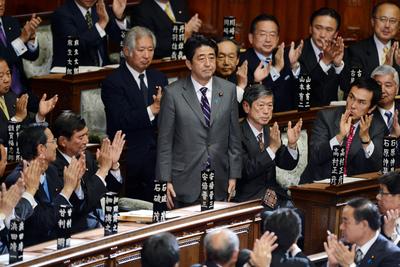One such area is public law reform, which had been a key part of the former government’s election platform in 2009.
It remains to be seen which, if any, of the Democratic Party of Japan’s (DPJ) public law reforms the new prime minister, Shinzo Abe, will run with during his term in office. The election manifesto of the newly elected Liberal Democratic Party (LDP) calls for ‘administrative reform’, but is short on detail. Still, the manifesto does highlight two public law matters that were pet projects of Abe under his previous administration in 2006–07.
The first is constitutional amendment: in particular, softening the war-renouncing Article 9, but also a number of other conservative favourites, such as clarifying the emperor’s role as head of state and inserting a provision mandating ‘respect for the family unit’. Abe made similar proposals previously, and took the first step toward eventual amendment by putting in place a National Referendum Law, setting out the process for any future referenda on constitutional amendment.
The Constitution requires any proposed amendments to be approved by a two-thirds majority in both houses of the Diet before such a referendum can be put. The LDP now enjoys a two-thirds majority in the lower house when added to the seats of its coalition partner, New Komeito (which is cool toward the amendment of Article 9 in particular), or else with the right-wing ‘third force’ party Nippon Ishin no Kai (which is far more enthusiastic). But the LDP lacks even a simple majority in the upper house. Abe will no doubt try to claim the LDP’s large majority as a mandate for amendment (despite an opinion poll in the Mainichi Shimbun newspaper in which only 2 per cent of voters nominated constitutional amendment as a key issue), and may use the LDP’s numbers to put his proposals before the Diet’s constitutional committees. However, he is unlikely to push for a vote until after the next upper house election, due in July 2013.
The other of Abe’s pet projects highlighted in the LDP’s manifesto is the proposal to create a ‘State System’ by merging Japan’s 47 prefectures into a dozen or so larger, semi-autonomous regional blocks. Almost immediately upon becoming prime minister in 2006 Abe introduced legislation for a pilot program to precede a more comprehensive ‘State System’ promotion bill. However, the DPJ allowed this program to lapse, preferring instead to focus on a series of decentralisation bills to give greater powers and financial autonomy to towns and cities. Under Abe, it is sure to re-emerge.
One key component of the DPJ’s reform agenda, to which the LDP’s manifesto makes no reference, is freedom of information. The DPJ promoted a stronger Information Disclosure Law for the better part of a decade, and soon after coming into power established a deliberative council to review the law in its entirety. An amendment bill was introduced to the House of Representatives in early 2011, but has languished in committee ever since. There is a good chance that the LDP will fail to reintroduce the amendment bill. Bureaucrats opposed many of the deliberative council’s recommendations, and the resulting bill appears to have been watered down. The LDP would gain little from antagonising the bureaucracy by reintroducing a piece of legislation that has already quietly slipped under the radar.
Another issue to have fallen by the wayside is reform of the system for appeals against agency decisions. Under the existing Administrative Appeal Law, these are conducted by way of internal review within the agency that made the original decision. Critics of the law point to problems such as inadequate investigation and the low rate of reversals. A separate deliberative council into the law recommended the creation of a separate corps of American-style administrative law judges with the power to deliberate in place of the agency and to issue non-binding draft decisions. However, the DPJ failed to implement its recommendations prior to the dissolution of the House of Representatives.
If Abe attempts to amend the Administrative Appeal Law, he is more likely to revert to a previous LDP bill, which lapsed when the DPJ came to power. That bill came out of a study commissioned during Abe’s prime ministership, and would have maintained a system of internal review while requiring agencies to consult with an external advisory body. This would no doubt be the approach preferred by the bureaucracy.
The LDP may be more sympathetic to a group of four bills on civil service personnel reform that were abandoned by the DPJ in mid-2012. The bills build on the Basic Law for Civil Service Reform passed with bi-partisan support in 2008, and are designed to increase flexibility in appointing and promoting civil servants and in determining pay-scales. They will also allow fluidity between the bureaucracy and the private sector, and harmonise labour rights for public servants with those of private sector employees.
Overall, however, it is difficult to see the LDP taking up the DPJ’s reform agenda with gusto. This is disappointing, as efforts to improve administrative law in Japan over the past decade have fallen short of the goals set forth by the Justice System Reform project in 2001. Outside of Abe’s preferred projects, public law under the LDP is likely to be very much ‘business as usual’.
Joel Rheuben is a solicitor pursuing postgraduate studies at the Faculty of Law, University of Tokyo.

